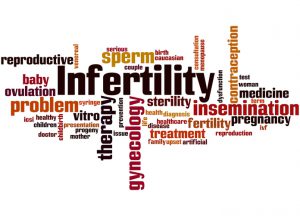Infertility can be a sensitive topic, and many people are hesitant to discuss their struggles openly. However, being informed about infertility is the best way to get the medical help you might need and to ensure the best chance at becoming pregnant.
What is the definition of infertility?
- In females under age 35, infertility is when you are unable to get pregnant after a year of having unprotected sex.1

- In females 35 and older, infertility is when you are unable to get pregnant after six months of having unprotected sex.
- In males of any age, infertility is when you are unable to impregnate a female after a year of having unprotected sex.
How many people are infertile?
According to the National Survey of Family Growth, 12.1% of females ages 15-44 have had difficulty getting pregnant or carrying a pregnancy to term.2
Know that you are not alone; there are many interventions that can result in a successful pregnancy, even if one or both partners are infertile.
Why does infertility happen?
There are many reasons why a couple or individual may be infertile, as conception is a multi-step process.
- Ovulation: an egg leaves the female’s ovary and will eventually move down the fallopian tube
- Fertilization: a sperm and the egg join, providing all the genetic material needed for a zygote to develop
- Implantation: the fertilized egg attaches to the uterine lining
If any of these steps are unsuccessful, the zygote will be disposed of during the female’s next menstrual cycle.
Can males be infertile, too?
Males have infertility problems just as frequently as females.
In situations where two partners come in for fertility treatment, 1/3 of the time, the female is infertile, 1/3 of the time, the male is infertile, and 1/3 of the time, there is a combination of male and female infertility problems or the problem is unknown.
Does age affect fertility?
Yes. In females, fertility declines with age, especially in the mid-30s. This is partially because the eggs are older and may not be as healthy. Contrary to popular belief, male fertility also declines with age.
Do hormones affect fertility?
Yes. In females, a hormone imbalance called polycystic ovarian syndrome (PCOS) frequently results in infertility. In males, hypogonadism (low testosterone) or other hormones issues can contribute to infertility.
What other health conditions may cause female infertility?
Besides PCOS, these health conditions may cause female infertility:
- Primary ovarian insufficiency (POI)
- Pelvic inflammatory disease (PID)
- Endometriosis
- Ectopic pregnancy surgery
- Uterine fibroids (benign uterine tumors)
- Cancer
- Other physical problems with the reproductive organs, like blockages
What other health conditions may cause male infertility?
- Varicocele (large veins on the testicles)
- Low sperm count
- Problems with sperm motility (movement)
- Retrograde ejaculation or other ejaculation issues
- Antibodies that attack sperm
- Chromosomal abnormalities
- Other physical problems with the reproductive organs, like blockages
What other circumstances may put a female at risk for infertility?
- Smoking tobacco or marijuana
- Excessive alcohol use
- Drug use
- Being overweight or underweight
- Excessive exercise
- Stress
- Sexually transmitted diseases/infections (STDs/STIs)
What other circumstances may put a male at risk for infertility?
- Smoking tobacco or marijuana
- Excessive alcohol use
- Drug use
- Being overweight
- Stress
- Exposure to toxic substances, like lead
- Radiation or chemotherapy
- Certain medications
When should I visit a doctor about infertility concerns?
In general, females under 35 should wait a year before consulting a doctor, while women over 35 should only wait six months, as the chances of pregnancy lessen with age. However, if you are at risk of infertility or are experiencing certain symptoms, you may want to see a fertility specialist earlier. Risks and symptoms include:
- Irregular periods or no menstrual periods
- Very painful periods
- Endometriosis
- Pelvic inflammatory disease (PID)
- Two or more miscarriages
- Cancer treatment
- Previous fertility issues
What are some solutions to infertility?
Depending on the cause of infertility and the preferences of the patients, there are several fertility treatments available.
-
Medication
– Certain medications can help with hormone problems, ovulation and premature ejaculation.
-
Surgery –
Surgeries may be used to fix blockages, reverse vasectomies and repair varicocele.
-
Intrauterine Insemination (IUI) –
Also called artificial insemination, specially prepared sperm are inserted directly in the female’s uterus.
-
Assisted Reproductive Technology (ART)
– Egg and sperm are combined in a lab, and the fertilized egg is returned to the female partner’s body. This includes in vitro fertilization (IVF).
-
Surrogacy/Gestational Carrier
– In both cases, another female carries the baby to term. In a surrogacy, the surrogate uses her egg and the male partner’s sperm. With a gestational carrier, the female and male partners both contribute their own egg and sperm and will be the genetic parents, while the carrier has no genetic relation to the baby.
What fertility services does the Colorado Center for Reproductive Medicine (CCRM) offer?
CCRM offers natural cycle monitoring, ovulation induction, IUI, laparoscopy, hysteroscopy, IVF, egg freezing, embryo freezing and more. If you would like to schedule an appointment to discuss infertility diagnosis or fertility treatment options, contact us at (844) 539-0628.



